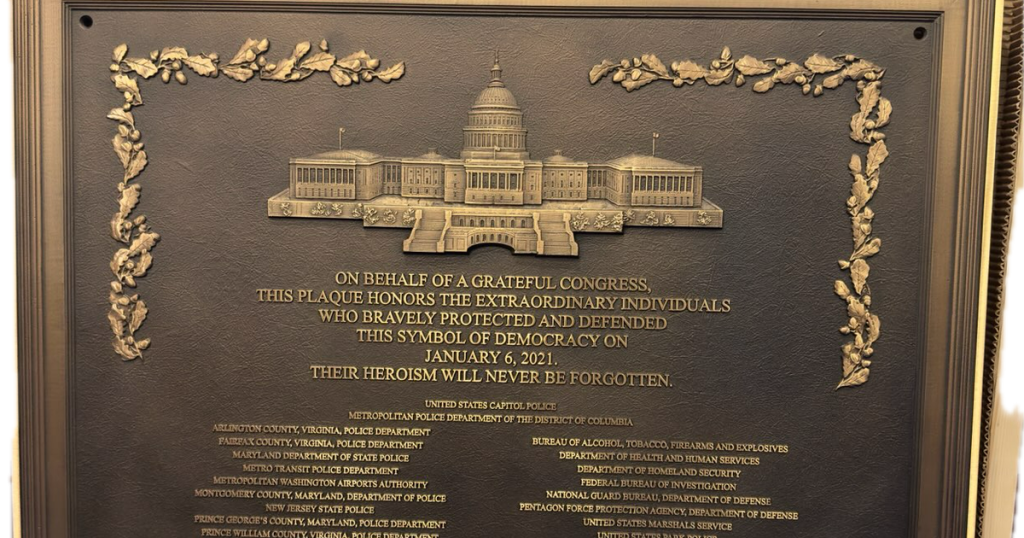Two police officers who defended the Capitol during the January 6, 2021, attack have initiated a federal civil lawsuit. They seek judicial intervention to mandate the hanging of a plaque honoring police heroes who protected the Capitol. The legal action underscores a politically charged atmosphere surrounding the plaque’s installation, which has become a contentious topic among lawmakers and the public alike.
| Article Subheadings |
|---|
| 1) Overview of the Lawsuit |
| 2) Legislative Context and Issues |
| 3) Politically Charged Implications |
| 4) Statements from Key Figures |
| 5) Future of the Legal Proceedings |
Overview of the Lawsuit
Former Capitol Police Officer Harry Dunn and D.C. Metropolitan Police Officer Daniel Hodges have filed a civil lawsuit in the U.S. District Court of the District of Columbia. The action aims to compel the Capitol to hang a plaque that honors law enforcement officers who defended the Capitol during the events of January 6. The officers argue that their efforts on that day should be recognized in a manner consistent with federal law. They have cited a 2022 statute signed by the President, which mandates the installation of this memorial, emphasizing that it should have been completed by March 2023.
Legislative Context and Issues
The plaque, which honors police heroes, has been completed and remains in storage. This situation has led to questions about the responsibilities of Congress. According to the lawsuit, the refusal to hang the plaque not only goes against the mandate of the 2022 law but also potentially violates the Equal Protection clause of the U.S. Constitution. The legal filing highlights that while other memorials for different tragedies have been established, the dedication for January 6 remains unfulfilled. Legal experts suggest that this omission adds a layer of complexity to the ongoing political discourse surrounding the attack.
Politically Charged Implications
The failure to install the plaque has broader political implications, particularly in relation to the ongoing investigations and narratives surrounding the January 6 events. The officers in their lawsuit accuse former President Donald Trump of promoting conspiracy theories that have permeated the Republican Party. The lawsuit mentions how, following the law’s enactment, public sentiment shifted as Trump began to downplay the severity of the Capitol attack, labeling it as a “day of love.” This shift has led to partisan divisions regarding the appropriateness of memorializing the police roles during the riots.
Statements from Key Figures
Attorney Brendan Ballou, who is representing Dunn and Hodges, commented on the situation, noting, “There seems to be no indication that congressional leadership will install this without judicial intervention.” His remarks reflect mounting frustrations over the lack of responsiveness from Republican leadership regarding the plaque. Commenting on this issue, Rep. Dan Goldman, a Democrat from New York, stated that the ongoing refusal to honor the officers indicates a disconnect in support for law enforcement among Republican leaders, especially in light of their silence regarding Trump’s pardons of various Capitol defendants.
Future of the Legal Proceedings
As the lawsuit awaits a judge’s assignment among the numerous federal judges available in Washington D.C., it has drawn considerable attention from both the public and lawmakers. The plaque’s continued storage on Capitol grounds has become a symbolic representation of larger disputes over federal acknowledgment of the events of January 6 and the people involved. The outcome of this lawsuit could set a precedent not only for this specific case but also for how the nation interprets and memorializes civic duty in the face of civil unrest.
| No. | Key Points |
|---|---|
| 1 | The lawsuit aims to enforce the federal law requiring a memorial plaque for police officers involved in the January 6 defense. |
| 2 | Political implications surround the plaque’s non-installation, highlighting partisan divides about January 6. |
| 3 | Statements from lawmakers reveal tensions over the lack of recognition for law enforcement amid pardons of January 6 defendants. |
| 4 | The outcome of the lawsuit could influence future memorialization of critical events in American history. |
| 5 | The plaque remains in storage, symbolizing ongoing frustrations related to legislative action and political accountability. |
Summary
This ongoing legal battle signals a crucial moment for how the United States memorializes law enforcement actions during moments of civil unrest. The insistence on hanging the plaque not only reflects a commitment to honoring those who protect democratic institutions but also raises questions about accountability and the political narratives surrounding one of the most controversial events in recent American history.
Frequently Asked Questions
Question: What is the legal basis for the officers’ lawsuit?
The officers argue that the failure to install the plaque violates a 2022 federal law, as well as the Equal Protection clause of the U.S. Constitution.
Question: Why is the plaque significant?
The plaque serves to honor the bravery of police officers who defended the Capitol during the January 6 attack, symbolizing recognition for their sacrifices.
Question: How has political sentiment shifted regarding January 6 events?
The lawsuit indicates a shifting narrative, particularly among Republican leadership, where the attack has been downplayed or reframed by some to minimize its severity.


